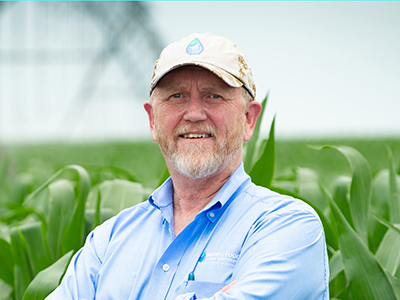As we continue to navigate through this global pandemic, the mission of the Daugherty Water for Food Global Institute (DWFI)—to secure more nutritious food with less stress on our scarce water resources—is more relevant and urgent than ever. We must expand and accelerate efforts to produce more nutritious food with less water; catalyze the development and deployment of solutions to the next generation of producers, water managers and entrepreneurs; strengthen water and food systems to adapt to water-related shocks; and reverse the wide-spread trend of water quality degradation.
This past year required us all to find ways to adapt to constraints on how we work and highlighted the importance of our network of committed partners. Students, faculty fellows, university leaders, producers, water managers and other stakeholders—both here and around the world—have developed creative ways to adjust to the challenges brought on by the re-occurring waves of the pandemic.
I am struck by what has been achieved in the past year. However, it is not our accomplishment alone. We thank all who have contributed to our vision, especially in the midst of a particularly difficult landscape. Here are some highlights of those successes:
- This past year saw the roll-out of the Water, Climate and Health program, a collaboration between the University of Nebraska Medical Center College of Public Health, the University of Nebraska–Lincoln Institute of Agriculture and Natural Resources and DWFI;
- We also launched the Drought, Water and Economics project, a team comprised of staff from the National Drought Mitigation Center, the UNL Department of Agricultural Economics and DWFI, with support from the Office of the Chief Economist at USDA;
- The institute received a reoccurring allocation of $500,000 in the Nebraska state budget for water research, advancing the institute’s work in Nebraska to improve water quality, enhance agricultural water management, predict and mitigate extreme events and sustain our valuable water resources;
- We continued progress in addressing water quality degradation, including a strategic collaboration within the Bazile Groundwater Management Area, and helping convene the state-wide nitrate strategy group;
- We further applied and developed of our suite of decision-support tools, including upgrading several eddy-co-variance towers to measure nitrous oxide and methane; significant new grants from the Department of Energy and USDA; and,
- The institute launched an important smallholder irrigation project in sub-Saharan Africa supported by the International Fund for Agricultural Development. I am especially delighted by the efforts of our team of young Rwandan professionals involved in this project, most of whom have recently completed degrees here at the University of Nebraska–Lincoln and are now implementing the program in Rwanda.
While in-person events and travel were not safely possible, we focused on hosting and supporting virtual events that supported our efforts on achieving impact. We were heartened that participation expanded to those who may not have been able to join us in the past, especially those overseas, including many small producers and ag-entrepreneurial startups. We were able to build on this experience through our Water for Food Global Forum in October, which convened leading international experts, growers and organizations virtually to focus on achieving global water and food security.
Despite the challenges and constraints, it has been a productive year, which would not have been possible on our own. I’d like to thank our staff, partners, donors, grant funders, Faculty Fellows, students, supporters and board of directors for your tireless efforts this past year. We look forward to developing more productive and resilient water for food systems and, sooner than later, getting to do so in person.
I wish you all a peaceful holiday season and a new year filled with health and happiness.
Peter G. McCornick
Executive Director
Daugherty Water for Food Global Institute


